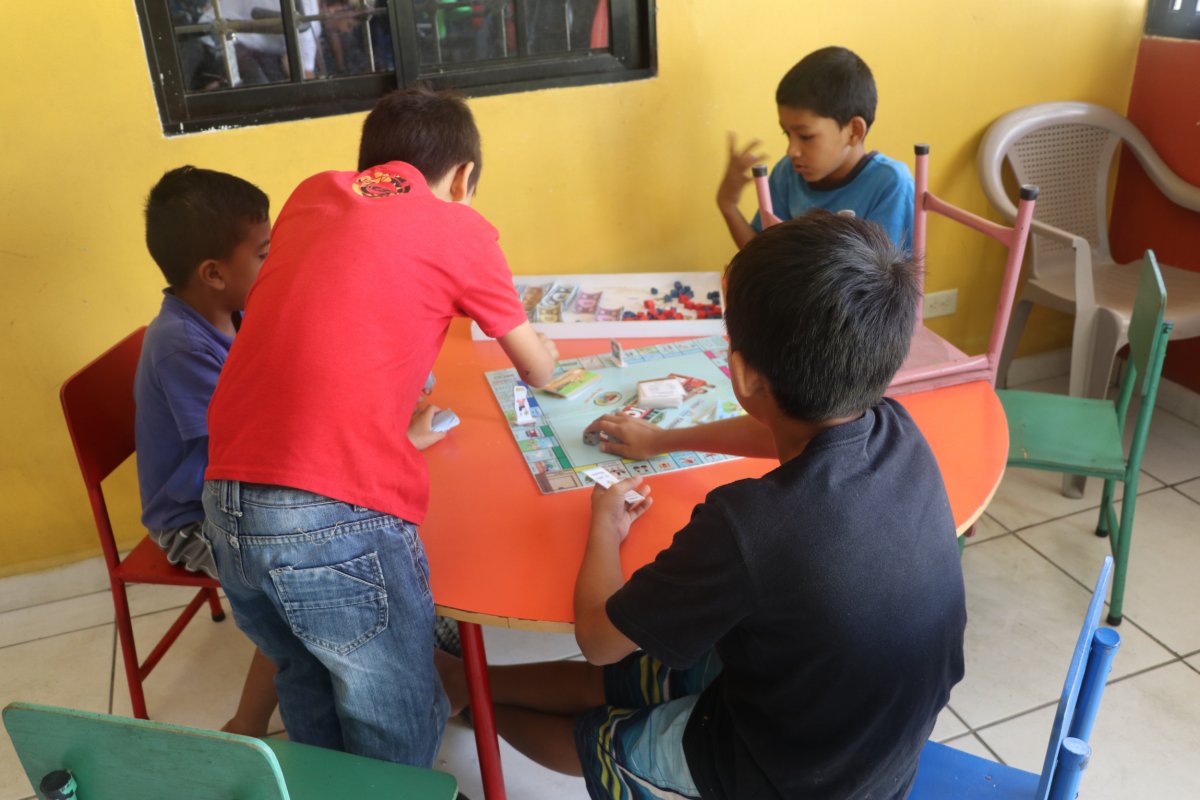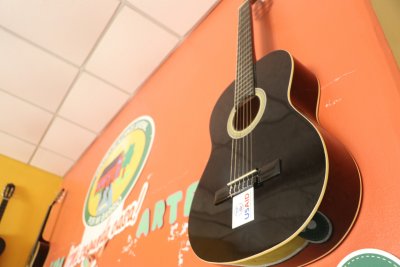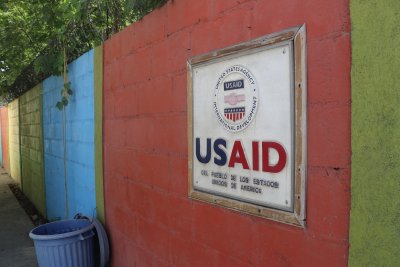Sunlight streams through the windows, dappling brightly-painted walls as children's laughter rings out above festive music blasting through the radio.
If you didn't already know, you would never be able to guess that the Puerta a las Misiones youth outreach center is smack dab in the middle of a danger zone.
Here in Rivera Hernández, one of the toughest neighborhoods in San Pedro Sula, Honduras, and perhaps one of the toughest neighborhoods in the world, streets are divided into five smaller districts, each under the control of a different gang.
In this neighborhood, it is gang leaders, not government, that hold the local authority-and here, they rule with a heavy fist. Cross into the wrong part of town or unknowingly break one of your local gang's rules and it could easily cost you your life.
With some of the world's most notorious gangs, including MS-13 and the 18th Street gang, running the neighborhood's streets, there are few places in Rivera Hernández for young people hoping to avoid a life of crime to turn to for guidance. But, for years, the Puerta a las Misiones center has long been known as one of them.
Here, young people can come for direction; they can come to play; they can come for computer classes and importantly, they can come for job training.
From electrician training to cosmetology, "many young people come here" to learn how to forge a path outside of gangs, Pastor Arnold Linares tells Newsweek. "This is an alternative."

'The poorest will suffer the consequences'
However, outreach centers just like this one across Honduras, Linares says, are now at risk thanks to President Donald Trump's decision to slash U.S. aid to Honduras, Guatemala and El Salvador, collectively known as the Northern Triangle, because he believes they have not done enough to stem the flow of migration to the U.S.
"We were paying them tremendous amounts of money, and we're not paying them any more because they haven't done a thing for us," Trump said in March, making good on a months-long threat to cut hundreds of millions of dollars in aid.
Shaking his head, Linares says: "This is a rash decision...and the poorest will suffer the consequences."
All of the good that happens at the Puerta a las Misiones outreach center, the pastor says, "began with USAID."
And throughout the center, the presence of the United States Agency for International Development can be felt everywhere. Outside the facility, a USAID plaque celebrates the role that the United States has had in bringing this center to fruition, while inside, USAID stickers have been slapped across nearly every piece of equipment at the center, from the guitars children play to the sinks barbers-in-training use to the computers that serve as windows to the world for children across the community.
While the Puerta a las Misiones outreach center has been gradually weaned off USAID funding, having met its "planned benchmarks" for progress, just the fact that the very programming that helped bring this center to life is being cut has sparked outrage in the community.
"It creates disappointment and anger and we are the ones who run the risk," Linares says.


'You can't promise these people things you can't deliver'
The risk, the pastor says, can be great because across communities in Honduras, it is not only young people who are disappointed about the Trump administration's cuts, but also the country's gang leaders.
Put simply, in neighborhoods like Rivera Hernández gang leaders are deeply interested in what goes on in the community. If an outreach center coordinator like Linares promises community workshops for youth, they expect him to deliver.
"Then, if USAID comes here and tells me that we don't have the budget, I have to go to the community and tell them and speak to the gangs and tell them...I'm the one who ends up at risk," he says.
"The gang members tell us if you don't have it, then don't promise it," he says. "You can't promise these people things you can't deliver."
Countless experts have warned that Trump's decision to slash USAID to Central American countries will only cause further instability in nations like Honduras, giving residents more reason to flee to the U.S. border.
For Linares, that much should be obvious to the U.S. leader.
"Coyotes, gang members, they all come out of our communities," Linares says, with coyotes being the term often used for smugglers, who often exploit asylum seekers hoping to make it onto U.S. soil.
"Rivera Hernández exports troublemakers," the pastor says.
However, in the last couple of years, Linares, says, the neighborhood has seen a major reduction in violence, almost "around 50 percent."
The significant drop in violence, he says, is in large part "due to these programs."
In a statement to Newsweek, USAID spokesperson Ryan Essman said the agency would "continue to move forward on the President's decision regarding foreign assistance for El Salvador, Honduras and Guatemala."
While USAID will continue to carry out objectives set in motion before the funding cuts, "we have ceased obligating new funds for those three countries," Essman said.
"The President and the Secretary believe that the Northern Triangle governments must stem migration to the United States and expects to see reductions in the number of immigrants from the Northern Triangle prior to any decisions relating to restarting assistance to El Salvador, Guatemala, and Honduras," he said.
Meanwhile, he said, "the State Department is engaging with the governments of El Salvador, Honduras, and Guatemala on additional efforts they should undertake to reduce illegal immigration to the United States, such as combatting human smuggling and human trafficking, enhancing border security, dissuading their citizens from illegally migrating, and receiving and reintegrating their returned citizens."
The Trump administration's justification of its funding cuts makes no sense to Linares.
"USAID assistance doesn't filter through the [Honduran] government. It goes straight to programs on the ground or through USAID staff," he says. "But, maybe President Trump doesn't know that the government of Honduras doesn't touch that money."
Strangling the funds that allow centers like his to run, Linares says, will not only have consequences in Honduras, but it will also undoubtedly have the opposite of Trump's desired effect: it will drive more people to the U.S. border.
"Violence is a sickness," Linares says. "And we always have to give it medicine."
Uncommon Knowledge
Newsweek is committed to challenging conventional wisdom and finding connections in the search for common ground.
Newsweek is committed to challenging conventional wisdom and finding connections in the search for common ground.
About the writer
Chantal Da Silva is Chief Correspondent at Newsweek, with a focus on immigration and human rights. She is a Canadian-British journalist whose work ... Read more
To read how Newsweek uses AI as a newsroom tool, Click here.








